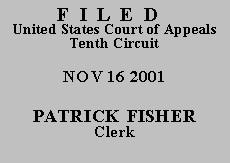

| JOHNNIE E. ROMO, SR.,
Petitioner-Appellant, |
|
| v. | |
| BOBBY BOONE,
Respondent-Appellee. |
|
Petitioner Johnnie Romo seeks a certificate of appealability to appeal the district court's dismissal of his pro se 28 U.S.C. § 2254 habeas petition. We deny his request for a certificate of appealability and dismiss the appeal.
Romo pled guilty on October 31, 1990, to willful injuring of public buildings in connection with damage to prison property while he was incarcerated on an unrelated offense, and was sentenced to three years' imprisonment. He did not seek to withdraw his guilty plea and he did not file a direct appeal. His post-conviction application in state court was pending from March to May of 1999. He filed his federal habeas proceeding on January 21, 2000, alleging his conviction violated double jeopardy because he previously had been fined in a prison disciplinary proceeding for the same conduct. The district court dismissed the habeas action because it was filed beyond the one-year statute of limitations imposed by the Antiterrorism and Effective Death Penalty Act of 1996 (AEDPA), 28 U.S.C. § 2244(d).
A petitioner whose conviction became final on or before April 24, 1996, must file his or her habeas petition before April 24, 1997. Miller v. Marr, 141 F.3d 976, 978 (1998). The time during which a properly filed application for state post-conviction or other collateral review is pending is not counted toward the period of limitation. 28 U.S.C. § 2244(d)(2).
Romo contends that State v. Campbell, 965 P.2d 991 (Okla. Crim. App. 1998), constitutes an intervening change in the law. In Campbell, the Oklahoma Court of Criminal Appeals (OCCA) held that imposition of a fine following prior imposition of prison discipline for the same conduct constituted a violation of double jeopardy. Romo argues this intervening change would make his state application for post-conviction relief timely, which in turn would toll the time for filing under the AEDPA. However, the OCCA rejected Romo's argument in its order affirming denial of post-conviction relief and held that even if Campbell was an intervening change in the law, it was not retroactive. See ROA, Doc. 7, attachment. Further, Romo does not explain how his request for federal habeas relief could be rendered timely even if his request for state post-conviction relief was rendered timely under state law.
Romo has not made a substantial showing of the denial of a constitutional right. See 28 U.S.C. § 2253(c)(2). We DENY a certificate of appealability, DENY the request for oral argument, and DISMISS the appeal. The mandate shall issue forthwith.
Entered for the Court
Mary Beck Briscoe
Circuit Judge
*.This order and judgment is not binding precedent, except under the doctrines of law of the case, res judicata, and collateral estoppel. The court generally disfavors the citation of orders and judgments; nevertheless, an order and judgment may be cited under the terms and conditions of 10th Cir. R. 36.3.